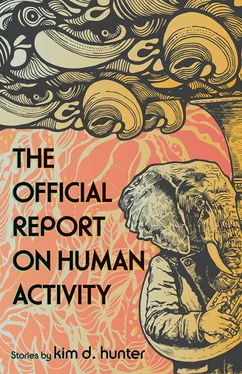The very idea of being able to engage people without boring them senseless made him almost immobile with a strange joy. The loneliness that had tracked him like a hound, that he had been trying to deny since childhood, felt too close to ignore. It almost had a face, a presence he could grasp and dispatch.
* * *
The Author and the Scientist got together after the experiment. They met at a public music machine event. The opening comedy act was so amazingly lifelike that some folks didn’t laugh when it began dismembering itself and making jokes about the pain. The performer then opened its chest, pulled out the pulsing equivalent of its heart, and pointed to a patron in the front circle who was laughing almost to the point of tears.
“Looks like you could use one these,” the act said, and tried to give the organ to the person in the front who was now convulsed with laughter.
But not everyone was laughing. There were, in fact, enough twinges of sadness throughout the crowd to register with Review Services. People actually tried to hack the names of the employees who had authored the creature. In fact, there were so many serious and sophisticated hacks into the system, the authorities had difficulty trying to fine people for illegal access.
Even the Scientist was tempted to look up the names of those employees, as he was so taken aback by the detailed “biology” of the stagecraft.
“It was almost like the mind meld of video work,” he said with as much admiration as his affectless voice would allow.
“No, no,” laughed the Author. “Video is just straight narcotic, opiate. This sort of stagecraft is way more psychedelic, like the Bliss Garden.”
“Bliss Garden?” he said, utterly puzzled.
It dawned on her, or actually hit her like a freight train, that he’d somehow experienced the psychedelics she’d slipped into his drink without realizing it was drugs that had altered his consciousness. When he’d first told her about seeing the wings on his back, she’d just smiled and he smiled and she put her head to his. They’d fallen into kissing and made love. Now, she realized how completely she understood him. She even knew his blind spots and had a hint of how large those blind spots had grown in the vacuum of his social interactions.
“Yes my dearest,” she almost cooed as she grasped his hand, “Where do you think your wings came from?”
He sat back without releasing her hand, but was lost in what was almost a full-blown flashback. The hallucinations had not been what occupied him at the time and, somehow, had not fully registered as having been chemically induced. It was the connection he’d felt most deeply. Her laughter at his wings had had no content or affect beyond the melody of her voice, and even that had been swallowed by the experience of being in another person’s mind and in his own all at once.
She mistook the look of wonder on his face as one of humiliation and, at that moment, decided the two of them would never do psychedelics together again. He was precious to her. There would be time enough later to shore up his fragilities.
They eventually got married and pregnant. The pregnancy started out fine, but the closer they came to delivery, the more anxious the Author became. Days before the due date, she contacted her old supplier and procured some psychedelics that had generally been good for relieving anxiety. She debated whether to take them before the delivery or to take them the day of. But the days before were filled with preparation, so she waited.
Most of the time, she had dropped acid in comfortable, controlled situations that had already gone a long way toward reducing anxiety. The new experience of birthing a child was one that made her feel acutely anxious—this despite all the encouragement and instruction she and the Scientist had received from the one midwife they could find, a kind but positively ancient (she still had a functioning phone and a driver’s license) woman.
The Author dropped the acid on the day she was sure she would deliver, taking slightly more than she had planned but a bit less than usual. It was the contractions that most concerned her and that she most meditated upon at first, despite herself. When the medical information says to anticipate pain, you know it’s going to hurt, but the actual experience of pain, the specifics of it, you may not know until the actual event, and so it was for her with childbirth.
The Midwife thought the Author’s breathing was quite shallow and encouraged her to take deeper breaths. The acid had begun to take hold and, to the Author, it seemed as though she was already inhaling and exhaling vast oceans of air, more than any human had a right to. For a moment, she feared there might not be enough air left for others in the room there to assist with the birth. Nonetheless, she had a great deal of trust in the very dark woman with the very deep folds of skin beneath her eyes, and if the woman requested hurricane strength breathing, then a hurricane it would be. The Midwife’s approval of the increased breathing gave the Author such a feeling of warmth and accomplishment that she almost forgot about the contractions and the fact that her body, the bones in her pelvis, would soon open wide enough to let another person, albeit a small one, through.
Imagining what the baby would be like, she found herself squatting in a pool of blue light. There with her in the blue was the Midwife, and her husband the Scientist, doing as they had done in the birthing room. In the darkness, she could see musical instruments.
This must be a stage, she thought, and had the sudden urge to look behind her to see if there were seats where the audience used to sit. That was wrong she thought. It was not where the audience used to be seated but would be seated. Clearly, a performance was about to take place. The instruments and the devices into which people would speak (sing?) were shiny and in place, ready to go. In fact, someone was already singing. Was she practicing? Yes, she was warming up, a woman’s voice but sometimes sounding like a girl.
“This is the first birth in thirty-five years where I haven’t known the gender and god knows what else about the child before it came,” said the Midwife, both happy and nostalgic. “But it feels like a girl. Anyway, it’s time to push.”
* * *
The pressure to create a normal story was very different from the pressure the Author had felt when it came time to give birth. There was no pleasure woven into the fear. The surges of anxiety around the story never came with unexplained laughter as they had when she carried the child.
Though, the economic anxiety and pressure of her husband being out of work did not worry her as much or concern her in the same way as the lack of anything between the two of them. It wasn’t uncommon for couples to feel a bit at sea once a child came along. But this was more troubling.
She’d first noticed it right after the birth. He had been talking enthusiastically about what it would be like to be at home with the baby. But her mind drifted to what she’d seen and where she’d been for a good chunk of her labor. Pieces of what he’d said “on stage” began to replace what he was saying at the moment, and she couldn’t untangle the sentences he was speaking now from what he’d said while she was high and delivering.
He noticed the sad and frustrated look on her face and his enthusiasm flagged. She hadn’t seen that look on his face since he’d entered the room to fix the interview device. She hoped he would not ask her to react in any way to what he’d just said because she had no idea what he’d just said.
He grasped her hand, but his expression was blank, and she realized that affectless mask was what he wore to hide the hurt of almost never being heard. She swore to herself then that she would never take another hit of acid no matter how anxious she became. She kept her promise she made to herself, even though there were times when she was certain that a good dose of something psychoactive would have helped the story and or the marriage. Then she would realize there was no potion for either.
Читать дальше












